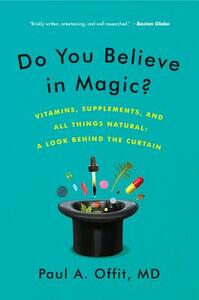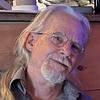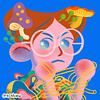Take a photo of a barcode or cover
93 reviews for:
Do You Believe in Magic?: Vitamins, Supplements, and All Things Natural: A Look Behind the Curtain
Paul A. Offit
93 reviews for:
Do You Believe in Magic?: Vitamins, Supplements, and All Things Natural: A Look Behind the Curtain
Paul A. Offit
Good stuff!
Critical thinking is a myth. Nothing is true (So everything is permitted. Ha!). We either believe or we don't. Medicine, like anything else, is subjective. Hard science isn't so hard, after all, eugenics can make a quack out of you. It was science. Lobotomy, too, was a science that medical people supported.
I guess the "It Could Be Placebo" Approach to the whole thing will make us sleep better at night. I still felt the angry tone of the book. I think the author did his best to be objective but you could tell how he really felt.
I really enjoy Offit's work.
Critical thinking is a myth. Nothing is true (So everything is permitted. Ha!). We either believe or we don't. Medicine, like anything else, is subjective. Hard science isn't so hard, after all, eugenics can make a quack out of you. It was science. Lobotomy, too, was a science that medical people supported.
I guess the "It Could Be Placebo" Approach to the whole thing will make us sleep better at night. I still felt the angry tone of the book. I think the author did his best to be objective but you could tell how he really felt.
I really enjoy Offit's work.
This was a great read and clearly laid out the science (or lack thereof) behind many alternative medicine approaches. The book nicely sums up why alternative medicine might work and how alternative medicine and mainstream medicine should relate to one another. I appreciated his call for scientific evidence to support all healthcare, his consistent use of calling Dr. Oz by his full name (Mehmet Oz), and the notion that consumers need to educate the!selves regarding their healthcare decisions. While outside of the scope of this book, I think it would have been useful to acknowledge more clearly that consumers rely on medical professionals for their information because scientific research is in many ways out of reach of the general public. That said, the book consistently states that medical professionals have a duty to sharing accurate and true information and that clearly disproven approaches should be abandoned. Also, shout out on picking the most amazing quotes to introduce chapters. Everything from Vonnegut to Shrek and all precisely what chapter intros should be.
Probably a four star book but I'm giving it a bonus star for dedicating 2 full pages to what an idiot Indiana's own Dan Burton is. I could probably write a ten page essay on my personal experiences related to Do You Believe in Magic, but it's summer and who wants to write that let alone read that. As someone who has dealt with rheumatoid arthritis for over fifteen years, I needed this book. It helped me reconcile a lot of my conflicted thinking. I've let media and individuals trick me into believing that I should have been pursuing "alternative" medicine since the beginning when Offit repeatedly reminds us that there are two types of medicine: medicine that works and medicine that doesn't. I appreciate that Offit doesn't touch food based therapies though I'm pretty sure he'd wary of a gluten free or casein free diet acting as a panacea for any given ailment. While I, too, am wary of elimination diets performing miracles, I remain a steadfast advocate on the powers of a plant-based diet for everyone!
Unfortunately, I have learned not to bother trying to discuss people's beliefs about hocus-pocus medical remedies like magnets and copper bracelets. Dr. Offit's written an interesting and compelling book about this sort of thing, but I suspect he's whistling in the wind.
I highly recommended this book for any science-minded person with questions about alternative medicine. The main thrust of the book talks about specific therapies, celebrity spokespeople, and practitioners who peddle risky false-cures and are certainly extremely dangerous. I alarmed to see how many of these absurd people and treatments persist today. This book sent me down a PubMed rabbit hole reading about clinical trials and lit reviews of most treatments mentioned in the book.
[Note: Before the rest of my review, let me define some terms. I use the verb “works” when a treatment is scientifically proven, with peer-reviewed, repeatable, reputable, accurate results in a scientific trial. “Medicine” means evidence-based medicine. I will use the term “practitioner” to refer to people who practice alternative therapies and are definitely not medical doctors.]
Science denial is one of the most frustrating things in the world for me. Alternative medicine becomes really dangerous when practitioners discourage patients from using treatments that actually work. Any practitioner who claims that their therapy works just because it’s innately true is a total quack. If it works, test it. People who create something “miraculous” then refuse to have it tested or refuse to believe the results of a trial are hucksters and frauds. Any doctor who demands patients not question their methods or their treatments is a quack. So many of these alternative practitioners and celebrity spokespeople refer to conventional medicine as being dangerous, harmful, or something vital that doctors withhold from patients. That’s idiotic. Magic bullets don’t exist, but that won’t stop people from looking for them and believing in fake miracle cures. Sadly this book only briefly took on chiropractic, so I highly recommend [b:How to Fake a Moon Landing|16087095|How to Fake a Moon Landing Exposing the Myths of Science Denial|Darryl Cunningham|https://d.gr-assets.com/books/1369320186s/16087095.jpg|21889685]’s chapter on it.
Throughout this book I was repeating to myself the mantra of the (highly recommended) medical history podcast Sawbones: CURE-ALLS CURE NOTHING. It was truly shocking to read how often coffee enemas are used to treat everything from cancer to aging to autism. That’s madness. Or how many many many different causes for a disease are put forth (for example autism being caused by misalignment of the spine, lack of oxygen, immune cell imbalance, heavy metal poisoning, incorrect wiring, chronic viral infections, intestinal parasites, lymph gland blockage -- to name just a few!), with myriad absurd and contradictory treatments (like chiropractic manipulation, hyperbaric chambers, infecting children with hookworms and whipworms, coffee enemas, magnetic stimulation, antiviral medications, chlorine dioxide [an industrial bleach], and lymphatic drainage massage, respective of the causes listed above).
Autism and cancer were probably the two most difficult sections, because it’s really clear how practitioners take advantage of desperate people. Even rational and reasonable people can be taken in when dealing with a traumatic diagnosis. So many of these therapies are so expensive, completely unregulated, and completely unproven. Stanislaw Burzynski’s antineoplastons (for cancer) Rashid Buttar’s use of chelation therapy/topical creams (for everything basically) are two horrifying science-denying “doctors” who prey on people in desperate situations.
One thing that stuck in my craw so bad: the lack of regulation in the vitamin/supplement industry. This is totally unconscionable to me. I don’t know why I assumed there was regulation in that industry, but it’s likely because of how vitamins are portrayed as essential and medical. The industry is seen as healthy and natural, but it is completely unregulated by the FDA (or anyone else!). Why should these supplements/remedies not be held to the same rigorous scrutiny as other drugs? They don’t have to report side effects! All the testing and regulation falls to the manufacturers and there is no regulatory oversight for manufacturing practices! They can also put virtually any health claim on a supplement label so long as it’s accompanied by, “These statements have not been evaluated by the Food and Drug Administration. This product is not intended to diagnose, treat, cure or prevent any disease.” That’s unbelievable. There are no guaranteed purity standards and no standardization of active ingredients. They have to prove NOTHING before selling a supplement or herbal remedy. And basically nothing after. I highly recommend this article from Science Based Medicine about supplement regulation (link). I also recommend this article (link) from the NYT about contaminants found in supplements, and this article (link) from Consumer Reports about the false claims of herbal remedies.
The last part of the book touched the very important effect of a lot of alternative therapies: the placebo effect. This can be incredibly effective with alternative treatments provided the treatment itself isn’t harmful and it’s not given with a discouragement toward actual medicine. Homeopathic “medicine” is literally just a placebo, so provided it’s not actively harmful it could possibly be beneficial in the short term. The placebo effect is powerful, and should be studied more to really understand how science can harness it better.
My only complaint is that there are tons of endnotes to support the claims made in the book, but no indication of that as you're reading. It makes the book more readable (you're not constantly being interrupted by numbers or symbols), but it makes it seem like he's pulling things out of the air unsupported. The support is there, it's just way at the end.
[Note: Before the rest of my review, let me define some terms. I use the verb “works” when a treatment is scientifically proven, with peer-reviewed, repeatable, reputable, accurate results in a scientific trial. “Medicine” means evidence-based medicine. I will use the term “practitioner” to refer to people who practice alternative therapies and are definitely not medical doctors.]
Science denial is one of the most frustrating things in the world for me. Alternative medicine becomes really dangerous when practitioners discourage patients from using treatments that actually work. Any practitioner who claims that their therapy works just because it’s innately true is a total quack. If it works, test it. People who create something “miraculous” then refuse to have it tested or refuse to believe the results of a trial are hucksters and frauds. Any doctor who demands patients not question their methods or their treatments is a quack. So many of these alternative practitioners and celebrity spokespeople refer to conventional medicine as being dangerous, harmful, or something vital that doctors withhold from patients. That’s idiotic. Magic bullets don’t exist, but that won’t stop people from looking for them and believing in fake miracle cures. Sadly this book only briefly took on chiropractic, so I highly recommend [b:How to Fake a Moon Landing|16087095|How to Fake a Moon Landing Exposing the Myths of Science Denial|Darryl Cunningham|https://d.gr-assets.com/books/1369320186s/16087095.jpg|21889685]’s chapter on it.
Throughout this book I was repeating to myself the mantra of the (highly recommended) medical history podcast Sawbones: CURE-ALLS CURE NOTHING. It was truly shocking to read how often coffee enemas are used to treat everything from cancer to aging to autism. That’s madness. Or how many many many different causes for a disease are put forth (for example autism being caused by misalignment of the spine, lack of oxygen, immune cell imbalance, heavy metal poisoning, incorrect wiring, chronic viral infections, intestinal parasites, lymph gland blockage -- to name just a few!), with myriad absurd and contradictory treatments (like chiropractic manipulation, hyperbaric chambers, infecting children with hookworms and whipworms, coffee enemas, magnetic stimulation, antiviral medications, chlorine dioxide [an industrial bleach], and lymphatic drainage massage, respective of the causes listed above).
Autism and cancer were probably the two most difficult sections, because it’s really clear how practitioners take advantage of desperate people. Even rational and reasonable people can be taken in when dealing with a traumatic diagnosis. So many of these therapies are so expensive, completely unregulated, and completely unproven. Stanislaw Burzynski’s antineoplastons (for cancer) Rashid Buttar’s use of chelation therapy/topical creams (for everything basically) are two horrifying science-denying “doctors” who prey on people in desperate situations.
One thing that stuck in my craw so bad: the lack of regulation in the vitamin/supplement industry. This is totally unconscionable to me. I don’t know why I assumed there was regulation in that industry, but it’s likely because of how vitamins are portrayed as essential and medical. The industry is seen as healthy and natural, but it is completely unregulated by the FDA (or anyone else!). Why should these supplements/remedies not be held to the same rigorous scrutiny as other drugs? They don’t have to report side effects! All the testing and regulation falls to the manufacturers and there is no regulatory oversight for manufacturing practices! They can also put virtually any health claim on a supplement label so long as it’s accompanied by, “These statements have not been evaluated by the Food and Drug Administration. This product is not intended to diagnose, treat, cure or prevent any disease.” That’s unbelievable. There are no guaranteed purity standards and no standardization of active ingredients. They have to prove NOTHING before selling a supplement or herbal remedy. And basically nothing after. I highly recommend this article from Science Based Medicine about supplement regulation (link). I also recommend this article (link) from the NYT about contaminants found in supplements, and this article (link) from Consumer Reports about the false claims of herbal remedies.
The last part of the book touched the very important effect of a lot of alternative therapies: the placebo effect. This can be incredibly effective with alternative treatments provided the treatment itself isn’t harmful and it’s not given with a discouragement toward actual medicine. Homeopathic “medicine” is literally just a placebo, so provided it’s not actively harmful it could possibly be beneficial in the short term. The placebo effect is powerful, and should be studied more to really understand how science can harness it better.
My only complaint is that there are tons of endnotes to support the claims made in the book, but no indication of that as you're reading. It makes the book more readable (you're not constantly being interrupted by numbers or symbols), but it makes it seem like he's pulling things out of the air unsupported. The support is there, it's just way at the end.
Good stuff!
Critical thinking is a myth. Nothing is true (So everything is permitted. Ha!). We either believe or we don't. Medicine, like anything else, is subjective. Hard science isn't so hard, after all, eugenics can make a quack out of you. It was science. Lobotomy, too, was a science that medical people supported.
I guess the "It Could Be Placebo" Approach to the whole thing will make us sleep better at night. I still felt the angry tone of the book. I think the author did his best to be objective but you could tell how he really felt.
I really enjoy Offit's work.
Critical thinking is a myth. Nothing is true (So everything is permitted. Ha!). We either believe or we don't. Medicine, like anything else, is subjective. Hard science isn't so hard, after all, eugenics can make a quack out of you. It was science. Lobotomy, too, was a science that medical people supported.
I guess the "It Could Be Placebo" Approach to the whole thing will make us sleep better at night. I still felt the angry tone of the book. I think the author did his best to be objective but you could tell how he really felt.
I really enjoy Offit's work.
I'm a big fan of Offit's writings on vaccines and autism, so I was looking forward to this book. I came away from it feeling that it was a bit slight, though. Trying to get into the various claims of vitamin manufacturers, snake oil cancer treatments, dangerous treatments for autism, AND the dubious use of acupuncture and chiropracy in one book of less than 300 pages results in a book that feels a bit rushed and incomplete.
Excellent, evidence-driven and balanced treatment of alternative medicine. Offit forcefully makes the point that the dichotomy between standard and alternative medicine is a false one. Instead, there are only medicines that have been proven to work via proper clinical trials and those that haven't. Included in the latter are most "alternative" therapies, several of which he addresses.
Most eye-opening for me were the chapters on the supplements industry, which is not regulated by the FDA because their products contain only natural ingredients. Unfortunately, there is a lot out there in nature ready to kill us. I was surprised by the medical studies he cites that show that multi-vitamins are actually not good for you, and that out of 51,000 supplements available on the market only four have been shown to have any efficacy: calcium and vitamin D for post-menopausal women, folic acid for pregnant women to prevent birth defects, and omega-3 fatty acids to prevent heart disease.
In the last couple of chapters, he addresses the positive side of alternative medicine, as many of them trigger a strong placebo response that has a positive outcome for the patient. But Offit also points out that this doesn't mean all alternative medicines should get a free pass. Some of them are inherently harmful. Many prevent people from seeking better, proven, mainstream therapies for their conditions. Some of them are extremely expensive, and drain patients' pockets without providing any more benefit than a cheap sugar pill. The last, and most nebulous but probably still important, is that the sellers of alternative medicine promote magical thinking and scientific illiteracy, which erodes the ability of desperate patients to make good decisions about their own healthcare. He concludes that there is a place for alternative medicines in treating those diseases for which mainstream therapies are unavailable and for which the placebo response is the best thing we've got. Otherwise, go for medicines that have been proven to work in clinical trials.
Most eye-opening for me were the chapters on the supplements industry, which is not regulated by the FDA because their products contain only natural ingredients. Unfortunately, there is a lot out there in nature ready to kill us. I was surprised by the medical studies he cites that show that multi-vitamins are actually not good for you, and that out of 51,000 supplements available on the market only four have been shown to have any efficacy: calcium and vitamin D for post-menopausal women, folic acid for pregnant women to prevent birth defects, and omega-3 fatty acids to prevent heart disease.
In the last couple of chapters, he addresses the positive side of alternative medicine, as many of them trigger a strong placebo response that has a positive outcome for the patient. But Offit also points out that this doesn't mean all alternative medicines should get a free pass. Some of them are inherently harmful. Many prevent people from seeking better, proven, mainstream therapies for their conditions. Some of them are extremely expensive, and drain patients' pockets without providing any more benefit than a cheap sugar pill. The last, and most nebulous but probably still important, is that the sellers of alternative medicine promote magical thinking and scientific illiteracy, which erodes the ability of desperate patients to make good decisions about their own healthcare. He concludes that there is a place for alternative medicines in treating those diseases for which mainstream therapies are unavailable and for which the placebo response is the best thing we've got. Otherwise, go for medicines that have been proven to work in clinical trials.
No new evidence for me. Some interesting stories.
I don't know if it was on purpose(I'm choosing to believe that it was) but a lot of the evidence was anecdotal...the same type that alternative medicine depends on. As many of my professors said in grad school, though, you can't fight the anecdote with science. So, they were just fighting with an anecdote that showed the science.
I don't know if it was on purpose(I'm choosing to believe that it was) but a lot of the evidence was anecdotal...the same type that alternative medicine depends on. As many of my professors said in grad school, though, you can't fight the anecdote with science. So, they were just fighting with an anecdote that showed the science.




